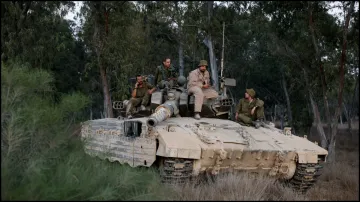Gaza: The Israeli military ordered Palestinians on Saturday to temporarily evacuate southern neighbourhoods of Gaza's Khan Younis so it could "forcefully operate" there. The military has ordered the residents to relocate to a designated humanitarian area in Al-Mawasi, according to an official statement, as the conflict is nearing ten months.
The order comes after reported rocket firings that Israel says originate from this specific area in the south. This is the second evacuation issued in a week in an area designated for Palestinians fleeing other parts of Gaza. The military said it fought Palestinian fighters in Khan Younis on Friday and destroyed tunnels and other infrastructure while trying to eliminate small units that hit the troops with mortar fire.
As per Palestinian official media, at least 14 people have been killed by Israeli attacks in Khan Younis since dawn on Saturday and their bodies were brought to Nasser Medical Complex. This came days after multiple Israeli airstrikes hit around Khan Younis, killing at least 70 people, according to Gaza's Health Ministry. More than 39,000 Palestinians have been killed by Israeli strikes in the enclave, according to Gaza health authorities.
Desperate conditions in humanitarian zones
The area where the residents have been asked to go is part of a 60-square-kilometre “humanitarian zone” to which Israel has been telling Palestinians to flee towards throughout the war. Much of the area is blanketed with tent camps that lack sanitation and medical facilities and have limited access to aid, United Nations and humanitarian groups say. About 1.8 million Palestinians are sheltering there, according to Israel's estimates, more than half of Gaza's pre-war population of 2.3 million.
Israeli officials estimate that some 14,000 fighters from militant groups including Hamas and Islamic Jihad have been killed or taken prisoner, out of a force they estimated to number more than 25,000 at the start of the war. The military said on Saturday its calls to evacuate were communicated to the population via several mediums in order to mitigate danger to civilians.
UN and humanitarian officials accuse Israel of using disproportionate force in the war, which it denies. Israel's military blames Hamas for putting civilians in harm's way, accusing it of operating within densely populated neighbourhoods, schools and hospitals as cover, something the group denies.
Developments in Israel-Hamas ceasefire
Meanwhile, Israel and Hamas are in agreement on the basic framework of the three-phase deal as it was presented by President Joe Biden in late May, according to senior Biden administration officials. Top administration officials, including Biden, have repeatedly expressed cautious optimism for weeks that a deal is close to being sealed.
There are serious differences between Israel and Hamas on a ceasefire deal. Among them are Hamas' demands that Israeli troops immediately leave the narrow strip of land between Gaza and Egypt known as the Philadelphia corridor, according to officials. Until May, Egypt had exercised full control of the roughly 14-kilometre strip.
Other kinks that still need to be worked out include differences on the number of Palestinian prisoners that would be released during the first phase and Israel's push to establish a vetting system for displaced Palestinians returning to northern Gaza after a cease-fire is established, the officials said.
(with inputs from agencies)
ALSO READ | Trump meets Israeli PM Netanyahu at Mar-a-Lago, criticises Kamala Harris' 'disrespectful' remarks
Latest World News
